Hard water silently damages your home’s plumbing system, causing limescale buildup that restricts water flow and eventually leads to leaks and bursts. Most homeowners don’t realize the extent of damage until facing expensive repairs, shortened appliance lifespans, and escalating energy bills. Water softeners prevent these issues by eliminating mineral buildup, extending appliance life, and improving water pressure. The financial difference between prevention and repair makes early installation the wiser investment.
Key Takeaways
- Homeowners face catastrophic plumbing failures when limescale buildup from hard water restricts flow and increases pressure in pipes.
- Water heater efficiency drops by 25% with hard water, causing higher energy bills and premature system failure.
- Appliance lifespans can be cut in half due to mineral buildup, leading to costly replacements of dishwashers and washing machines.
- Many homeowners report spending thousands on repairs before realizing a simple water softener could have prevented the damage.
- Installing a water softener provides immediate relief from hard water problems and protects plumbing systems from expensive future damage.
The Silent Plumbing Killer: How Hard Water Destroys Your Home From Within
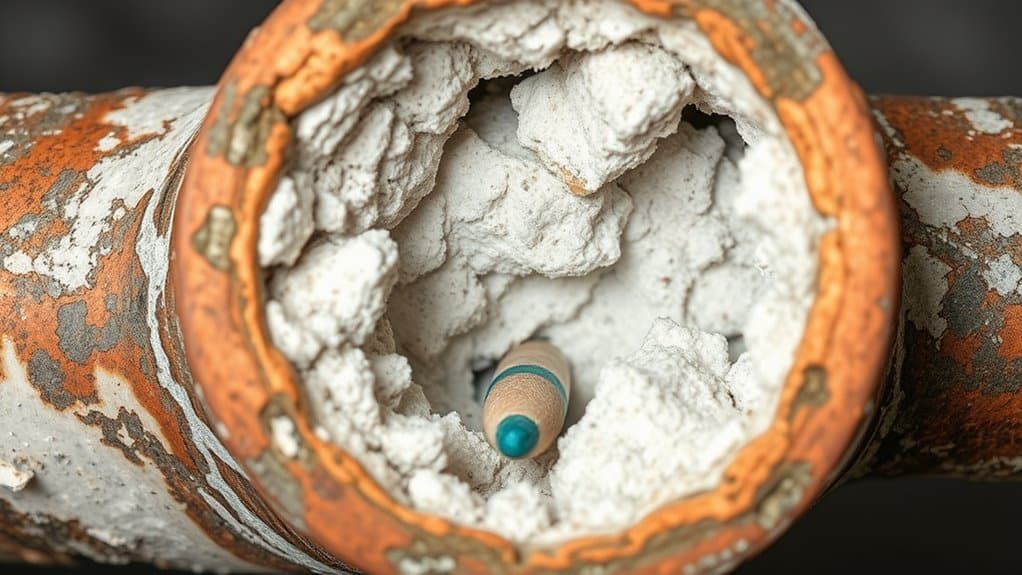
While you may not see it happening, hard water silently wreaks havoc on your home’s plumbing system every day. Calcium and magnesium minerals gradually create limescale buildup inside your pipes, restricting water flow and increasing pressure. We’ve seen countless homes where these mineral deposits have narrowed pipe diameters by up to 50%, leading to clogs, leaks, and even catastrophic bursts. This problem intensifies in older plumbing systems, where pipes may already be compromised. These minerals also accelerate corrosion of fixtures, leading to unsightly discoloration and premature failure. In fact, hard water damage can significantly reduce the lifespan of your plumbing infrastructure. The warning signs? Slow drains, standing water, and reduced water pressure throughout your home. Unfortunately, by the time you notice these symptoms, significant damage has already occurred.
Beyond Stained Sinks: The Real Cost of Hard Water on Your Wallet
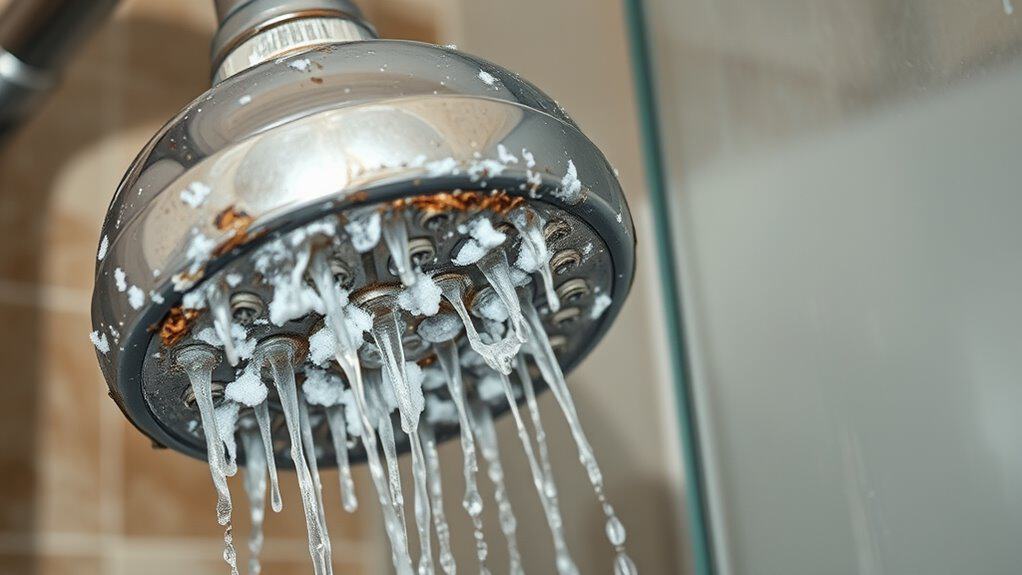
The damage to your plumbing system represents only the surface of hard water‘s true impact.
What you don’t see is its devastating financial toll.
We’ve found that hard water forces appliances to work harder, driving up energy bills while shortening their lifespan. In fact, a smart water softener can lead to significant savings, with some homeowners experiencing up to a 40% reduction in utility costs.
Your water heater becomes dramatically less efficient as scale builds up, consuming more electricity month after month.
In fact, water heaters can lose up to 25% efficiency when operating with hard water, significantly increasing your utility costs.
Meanwhile, you’re unconsciously spending more on cleaning products that struggle against mineral-laden water.
Laundry deteriorates faster, fixtures require frequent replacement, and your home’s resale value silently diminishes.
These costs compound over time—most homeowners don’t realize they’re hemorrhaging money until thousands have been wasted.
Appliance Graveyard: Why Your Machines Are Dying Prematurely
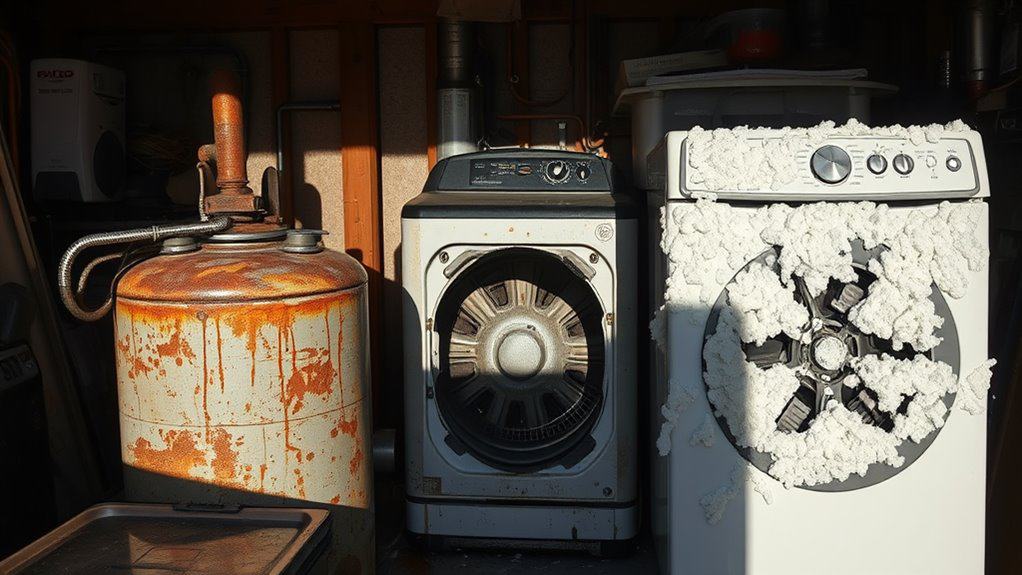
Your appliances are quietly sacrificing themselves to hard water’s relentless assault.
Water heaters develop scale around heating elements, reducing efficiency by up to 29% and accelerating anode rod corrosion. Regular flushing of water heaters is essential maintenance to remove accumulated sediment and scale buildup.
Washing machines suffer from clogged inlet valves and ineffective detergent action, leaving clothes dingy while mechanical parts deteriorate prematurely.
Dishwashers circulate water poorly with hard minerals, resulting in spotted glassware and permanent etching. Internal components fail as scale accumulates.
The economic impact is staggering—appliance lifespans cut by half, increased energy bills, and costly repairs.
Water softeners represent a practical solution to extend appliance longevity and protect your investment.
The Water Softener Solution: Transform Your Home’s Health Overnight
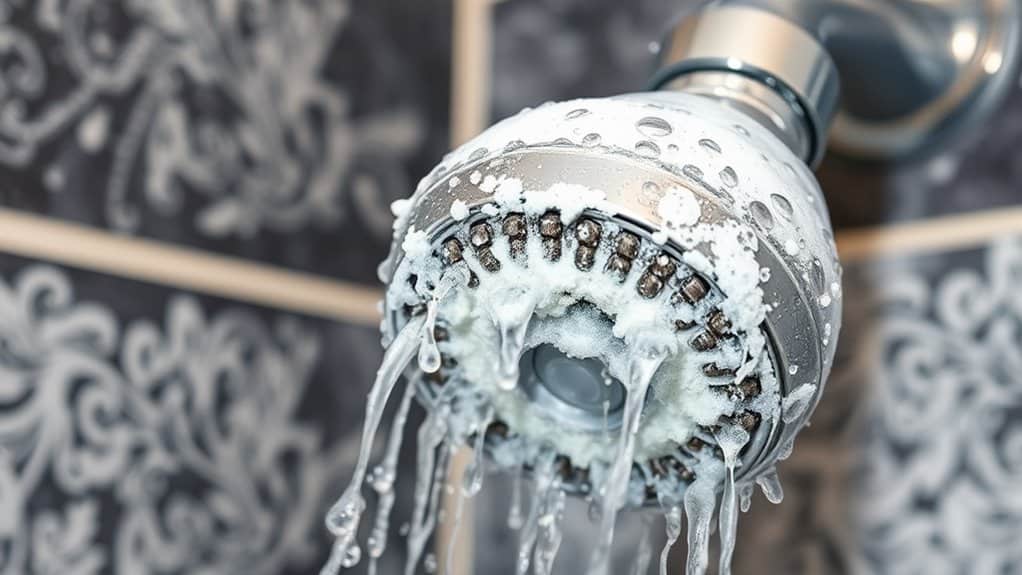
Installing a water softener represents perhaps the single most impactful investment homeowners can make to reverse hard water damage. We’ve seen these systems transform homes overnight, delivering immediate benefits across multiple fronts. A quality water softener effectively prevents mineral buildup that significantly reduces the efficiency of household appliances, leading to remarkably effective solutions that can surprise even the experts.
| Benefit Area | Before Softening | After Softening |
|---|---|---|
| Appliances | Short lifespan, inefficient | Extended life, optimal efficiency |
| Plumbing | Scale buildup, reduced flow | Clear pipes, consistent pressure |
| Cleaning | Constant struggle with stains | Effortless maintenance |
| Personal Care | Dry skin, dull hair | Softer skin, shinier hair |
| Costs | High utility bills, frequent repairs | Reduced expenses, fewer replacements |
Don’t wait until appliances fail. Water softeners provide immediate relief and long-term protection.
Frequently Asked Questions
How Do You Test for Hard Water at Home?
We recommend testing for hard water at home using DIY soap tests, commercial test strips, observing mineral deposits, or checking reduced soap lather. Water utility reports also provide reliable hardness information.
Are Water Softeners Safe for People With Health Restrictions?
We recommend caution for those with sodium restrictions, as water softeners add sodium. Consider potassium chloride alternatives or consult your doctor before using softened water if you’ve health concerns.
Can Hard Water Cause Hair Loss?
While hard water doesn’t directly cause permanent hair loss, we’ve found it weakens hair structure, increases breakage, and promotes scalp issues that contribute to excessive shedding and thinning over time.
Do Water Filters Remove Hard Water Minerals?
Most water filters don’t remove hard water minerals. While activated carbon filters target contaminants, they won’t soften water. For mineral removal, we recommend specialized systems like ion exchange softeners or reverse osmosis.
How Often Should Water Softener Salt Be Replaced?
We recommend checking salt levels monthly, but replenishment frequency varies: every 2-3 weeks for high-usage homes, 6-8 weeks for average households. Local water hardness and softener size also impact replacement needs.
Conclusion
We’ve seen how hard water silently damages your plumbing system, appliances, and budget. Don’t wait until you’re replacing a water heater or dealing with scaled pipes. Installing a water softener provides immediate protection against mineral buildup while extending appliance lifespan and improving water quality. The investment pays for itself through reduced repair costs, longer-lasting fixtures, and enhanced efficiency. Take action before the damage becomes irreversible.

Craig “The Water Guy” Phillips is the founder of Quality Water Treatment (QWT) and creator of SoftPro Water Systems.
With over 30 years of experience, Craig has transformed the water treatment industry through his commitment to honest solutions, innovative technology, and customer education.
Known for rejecting high-pressure sales tactics in favor of a consultative approach, Craig leads a family-owned business that serves thousands of households nationwide.
Craig continues to drive innovation in water treatment while maintaining his mission of “transforming water for the betterment of humanity” through transparent pricing, comprehensive customer support, and genuine expertise.
When not developing new water treatment solutions, Craig creates educational content to help homeowners make informed decisions about their water quality.


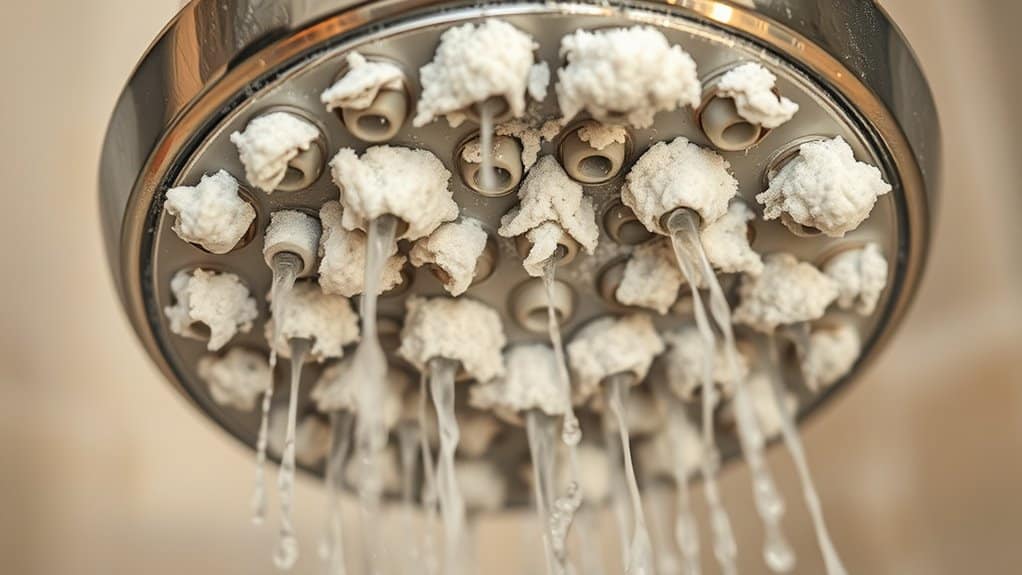
Your articles are extremely helpful to me. Please provide more information! http://www.ifashionstyles.com